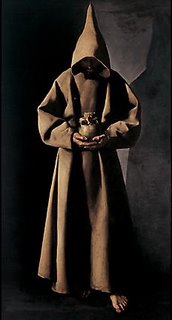 Readings: Jb 9,1-12.14-16; Ps 88,10-15; Lk 9,57-62
Readings: Jb 9,1-12.14-16; Ps 88,10-15; Lk 9,57-62Below is an excerpt from my homily for today's Memorial of St. Francis of Assisi. Even more than when speaking or writing about Pater/Frater Tom, when it comes to St. Francis mere words could never express my feelings, or the impact this great saint has had on me. I am not alone. Another person whose life was deeply affected and influenced by Francesco Bernadone is Chiara Offreduccio, better known as St. Clare.
Among the saints of the Church, Francesco Bernadone is easily the most recognizable and best loved. He is seen as something of a patron for environmentalists and peace movement activists. To a certain degree this is fine and well. But to restrict or reduce this great man to only that is to miss the fundamental meaning of his life. He was a man who was wholly transformed, through God's gratuitous action, into the image of Christ.
In a letter, written in August, Pope Benedict XVI wrote about St. Francis to the current bishop of the Diocese of Assisi. In his letter the Holy Father said, "He was not merely an environmentalist or a pacifist. He was, above all, a converted man." His conversion to Jesus Christ, for whose sake St. Francis "made a 'radical choice' and from there gradually came to understand what it meant to 'rebuild the house of the Lord,'" makes him, according to Benedict, a model of conversion and holiness who is "more valid than ever for today's Church."
After his conversion, St. Francis, like Jesus himself in today's Gospel, began to draw followers. These would be disciples, or Franciscans, like the first man in today's Gospel who says he wants to follow the Lord, were met with the reply that to follow meant, literally, giving up everything to rely only on God who, through the generosity of others, would provide for all their needs. It is easy to forget that St. Francis was not a priest. He was ordained a deacon because, as a loyal son of the Church, our mater et magistra, he wanted to preach licitly in Churches and in the name of the Church.
Like all holy men and women, St. Francis suffered. He suffered at the hands of his own followers, dying outside the Franciscan order. He suffered in the early days following his conversion from ridicule and abuse heaped on him by former friends and the people of Assisi, who thought he had gone crazy. As we all know, he was led by the Lord to the little, dilapidated Church of San Damiano, where, while praying before the crucifix, he was told by the Lord "Rebuild my Church." True to his trusting and childlike nature, which was a gift of his conversion, part of his transformation from a worldwise playboy and would-be merchant, he obeyed literally by rebuilding San Damiano and restoring it with his own hands. More significantly he rebuilt a Church badly in need of reform by his poverty, chastity, obediance and overall evangelical zeal, all motivated by love. Along with his contemporary, St. Dominic, he was instrumental in bringing about a revival in the Church by the breath of God, the Holy Spirit.
St. Francis accepted all the suffering, be it physical, mental, or spiritual, that came his way as a privileged channel through which, in imitation of our Lord and Savior, he was made perfect, even receiving in his own body the wounds of Christ. With genuine humility, Francis felt himself unworthy to bear the wounds of Christ and always sought to hide them, with many close to him not knowing that he had received the stigmata until he died.
May we, like St. Francis of Assisi, heed the call of Christ on our own lives, setting our hand to the plow and not looking back, in order that we may be fit, by grace, for God's Kingdom. May we be true heralds of the Kingdom God, preaching the Gospel and using words only when necessary. Christian singer-songwriter Michael Card captures the spirit of St. Francis perfectly in his song God's Own Fool: "So come lose your life for a carpenter's Son/For a madman who died for a dream/Then you'll have the faith his first followers had/And you'll feel the weight of the beam/So we follow God's own fool/For only the foolish can tell/Believe the unbelievable/Come be a fool as well".


No comments:
Post a Comment